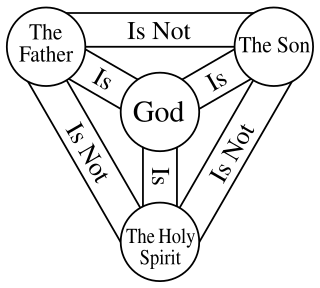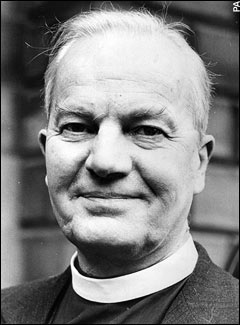
The Christian doctrine of the Trinity is the central doctrine concerning the nature of God in most Christian churches, which defines one God existing in three coequal, coeternal, consubstantial divine persons: God the Father, God the Son and God the Holy Spirit, three distinct persons (hypostases) sharing one essence/substance/nature (homoousion). As the Fourth Lateran Council declared, it is the Father who begets, the Son who is begotten, and the Holy Spirit who proceeds. In this context, one essence/nature defines what God is, while the three persons define who God is. This expresses at once their distinction and their indissoluble unity. Thus, the entire process of creation and grace is viewed as a single shared action of the three divine persons, in which each person manifests the attributes unique to them in the Trinity, thereby proving that everything comes "from the Father," "through the Son," and "in the Holy Spirit."
Missiology is the academic study of the Christian mission history and methodology. It began to be developed as an academic discipline in the 19th century.
Nontrinitarianism is a form of Christianity that rejects the mainstream Christian theology of the Trinity—the belief that God is three distinct hypostases or persons who are coeternal, coequal, and indivisibly united in one being, or essence. Certain religious groups that emerged during the Protestant Reformation have historically been known as antitrinitarian.

God the Father is a title given to God in Christianity. In mainstream trinitarian Christianity, God the Father is regarded as the first person of the Trinity, followed by the second person, God the Son Jesus Christ, and the third person, God the Holy Spirit. Since the second century, Christian creeds included affirmation of belief in "God the Father (Almighty)", primarily in his capacity as "Father and creator of the universe".

Jürgen Moltmann is a German Reformed theologian who is Professor Emeritus of Systematic Theology at the University of Tübingen and is known for his books such as the Theology of Hope, The Crucified God, God in Creation and other contributions to systematic theology. Jürgen Moltmann is the husband of Elisabeth Moltmann-Wendel, a notable feminist theologian. Jürgen Moltmann described his own theology as an extension of Karl Barth's theological works, especially the Church Dogmatics, and he has described his own work as Post-Barthian. He has received honorary doctorates from a number of institutions, such as Duke University (1973), the University of Louvain in Belgium (1995), the Alexandru Ioan Cuza University in Romania (1996), the Chung Yuan Christian University in Taiwan (2002), the Nicaraguan Evangelical University (2002), and the University of Pretoria in South Africa (2017). Moltmann was selected to deliver the prestigious Gifford Lectures in 1984–85, and was also the recipient of the 2000 University of Louisville and Louisville Presbyterian Theological Seminary Grawemeyer Award in Religion.
Indigenous churches are churches suited to local culture and led by local Christians. There have been two main Protestant strategies proposed for the creation of indigenous churches:
- Indigenization: Foreign missionaries create well-organized churches and then hand them over to local converts. The foreign mission is generally seen as a scaffolding which must be removed once the fellowship of believers is functioning properly. Missionaries provide teaching, pastoral care, sacraments, buildings, finance and authority, and train local converts to take over these responsibilities. Thus the church becomes indigenous. It becomes self-supporting, self-propagating and self-governing.
- Indigeneity: Foreign missionaries do not create churches, but simply help local converts develop their own spiritual gifts and leadership abilities and gradually develop their own churches. Missionaries provide teaching and pastoral care alone. The church is thus indigenous from the start. It has always been self-supporting, self-propagating and self-governing.
In Christianity, Neo-orthodoxy or Neoorthodoxy, also known as theology of crisis and dialectical theology, was a theological movement developed in the aftermath of the First World War. The movement was largely a reaction against doctrines of 19th century liberal theology and a reevaluation of the teachings of the Reformation. Karl Barth is the leading figure associated with the movement. In the U.S., Reinhold Niebuhr was a leading exponent of neo-orthodoxy. It is unrelated to Eastern Orthodoxy.

Thomas Forsyth Torrance, commonly referred to as T. F. Torrance, was a Scottish Protestant theologian and minister. He was a member of the famed Torrance family of theologians. Torrance served for 27 years as professor of Christian dogmatics at New College, in the University of Edinburgh. He is best known for his pioneering work in the study of science and theology, but he is equally respected for his work in systematic theology.

The attributes of God are specific characteristics of God discussed in Christian theology.
Missional living is a Christian practice to adopt the thinking, behaviors, and practices of a missionary in everyday life, in order to engage others with the gospel message.
Redemptoris missio, subtitled On the permanent validity of the Church's missionary mandate, is an encyclical by Pope John Paul II published on 7 December 1990. The release coincided with the twenty-fifth anniversary of Vatican II's Decree on the Church's Missionary Activity, Ad gentes. It is devoted to the subject of "the urgency of missionary activity" and in it the pope wished "to invite the Church to renew her missionary commitment."
Reinhard Hütter is a Christian theologian and Professor of Fundamental and Dogmatic Theology at The Catholic University of America. During the 2012–2013 academic year, he held The Rev. Robert J. Randall Professor in Christian Culture chair at Providence College.

Subordinationism is a Trinitarian doctrine wherein the Son is subordinate to the Father, not only in submission and role, but with actual ontological subordination to varying degrees. It posits a hierarchical ranking of the persons of the Trinity, implying ontological subordination of the persons of the Son and the Holy Spirit. It was condemned as heretical in the Second Council of Constantinople.
David Jacobus Bosch was an influential missiologist and theologian best known for his book Transforming Mission: Paradigm Shifts in Theology of Mission (1991) — a major work on post-colonial Christian mission. He was a member of the Dutch Reformed Church in South Africa (NGK), also known by its English abbreviation DRC. On Freedom Day, 27 April 2013, he posthumously received the Order of the Baobab from the President of South Africa "for his selfless struggle for equality ... and his dedication to community upliftment. By doing so, he lived the values of non-racialism against the mainstream of his own culture."

In Christianity, God is believed to be the eternal, supreme being who created and preserves all things. Christians believe in a monotheistic conception of God, which is both transcendent and immanent. Christian teachings on the transcendence, immanence, and involvement of God in the world and his love for humanity exclude the belief that God is of the same substance as the created universe but accept that God the Son assumed hypostatically united human nature, thus becoming man in a unique event known as "the Incarnation".

Debate exists as to whether the earliest Church Fathers in Christian history believed in the doctrine of the Trinity – the Christian doctrine that God the Father, the Son and the Holy Spirit are three distinct persons sharing one homoousion (essence).

For the majority of Christian denominations, the Holy Spirit, or Holy Ghost, is believed to be the third person of the Trinity, a triune God manifested as God the Father, God the Son, and God the Holy Spirit, each being God. Nontrinitarian Christians, who reject the doctrine of the Trinity, differ significantly from mainstream Christianity in their beliefs about the Holy Spirit. In Christian theology, pneumatology is the study of the Holy Spirit. Due to Christianity's historical relationship with Judaism, theologians often identify the Holy Spirit with the concept of the Ruach Hakodesh in Jewish scripture, on the theory that Jesus was expanding upon these Jewish concepts. Similar names, and ideas, include the Ruach Elohim, Ruach YHWH, and the Ruach Hakodesh. In the New Testament it is identified with the Spirit of Christ, the Spirit of Truth, the Paraclete and the Holy Spirit.
Darrell Likens Guder is a theologian and missiologist who is Professor of Missional and Ecumenical Theology Emeritus at Princeton Theological Seminary.

Gustav Adolf Warneck (1834–1910) was a German missiologist. In 1874, he established the first German missiological journal, Allgemeine Missionszeitschift. He was also involved in the founding of the German Protestant Missions Committee in 1885, serving as secretary until 1901. He held the first university chair in missiology at Halle University from 1896 to 1908. He is considered to be one of the first missiologists. David Bosch describes him as "the father of missiology as a theological discipline."
Piet Schoonenberg, SJ was a Dutch Jesuit priest, theologian and professor of theology. Closely associated with the nouvelle théologie movement, he is best known for his major contributions to the Dutch Catechism of 1966.









